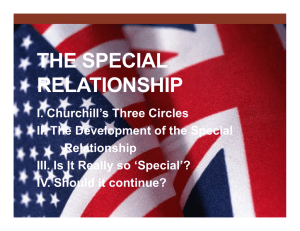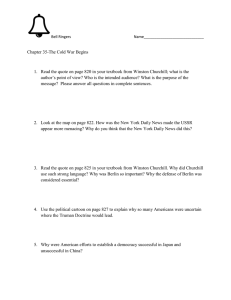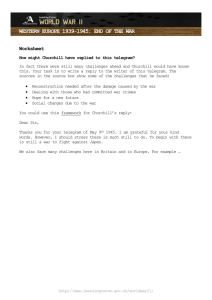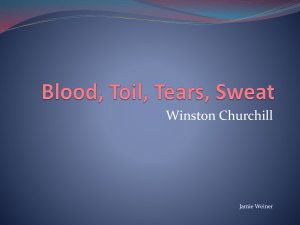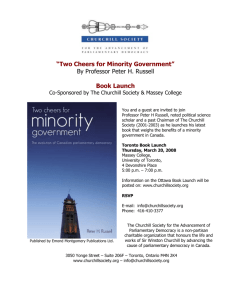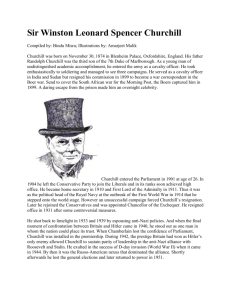Winston Churchill
advertisement
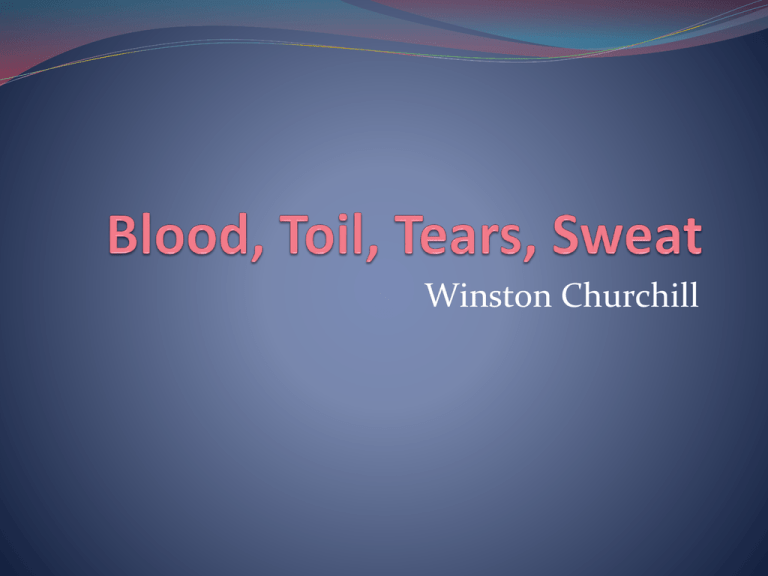
Winston Churchill About Churchill Sir Winston Leonard Spencer-Churchill (30 November 1874 – 24 January 1965) served as Prime Minister twice (1940–45 and 1951–55) Churchill was also an officer in the British Army, a historian, a writer, and an artist the only British prime minister to have received the Nobel Prize in Literature Background This speech was given by Winston Churchill, on his very first entrance into the House of Commons as Britain’s new Prime Minister with the presence of the outgoing prime minister. The speech came on May 13, 1940 at the beginning of the World War II when the armies of Adolf Hitler were roaring across Europe conquering country after country for Nazi Germany, . . When the existence and embellishment of Great Britain itself looked dim and uncertain. About WWII is beginning Churchill is warning the citizens of Great Britain to be prepared for battle It is imperative that Great Britain is victorious Without victory, Great Britain will not survive Without survival, Great Britain’s goals cannot be reached SOAPSTone –technique for analysis Subject: Occasion: Audience: Purpose: Speaker: Tone: Persuasive Diction Used Intense diction: “…we are in the preliminary stage of one of the greatest battles in history,” “We have before us an ordeal of the most grievous kind” “We have before us many, many long months of struggle and of suffering” Note: Allusion and Analysis “…we are in the preliminary stage of one of the greatest battles in history, that we are in action at many points in Norway and in Holland, that we have to be prepared in the Mediterranean, that the air battle is continuous and that many preparation have to be made here at home.” NOTES: Additional Rhetorical Devices Synecdoche and Parallelism: figure of speech in which a part stands for the whole “I have nothing to offer but blood, toil, tears, and sweat.” Analysis “I have nothing to offer but blood, toil, tears, and sweat.” Churchill is committed Churchill doesn’t want the British people to expect great or super-human things out of him. He does want them to know he is dedicated to serving his country and that he will match the efforts of every citizen to accomplish the difficult task ahead. Churchill is going to give this war his all Churchill wants to win no matter what it takes Term refers to hard work or effort put into a project (WWII) Note: Devices Anaphora: no survival . . . British Empire Random Repetition: forms a stronger and more meaningful message “…victory; victory at all costs, victory in spite of all terror, victory, however long and hard the road may be; for without victory, there is no survival.” Metonymy: Come then, let us go forward together with our united strength.” If everyone works together, Britain will be stronger and more powerful NOTES: Analysis of Anaphora “Let that be realized; no survival for the British Empire, no survival for all that the British Empire has stood for, no survival for the urge and impulse of the ages, that mankind will move forward towards its goal. NOTES: Devices Rhetorical Questions: Churchill asks these questions to get his audience to agree with him. “What is our policy?” “What is our aim?” The answer is obvious to the audience, but Churchill is making sure the audience is aware and truly believe the answer. Analysis “What is our aim? I can answer in one word: victory; victory at all costs, victory in spite of all terror, victory, however long and hard the road may be; for without victory, there is no survival.” NOTES: Ethos, Logos, Pathos Churchill uses strong ethos by speaking honestly and telling the truth. “I now invite the House…to record its approval of the steps taken and to declare its confidence in the new Government.” Note: Churchill uses logos by making sure his argument was clear, concise, and organized “Let that be realized; no survival for the British Empire, no survival for all that the British Empire has stood for…that mankind will move forward towards its goals.” Note: Churchill uses pathos by making sure the audience felt the passion in his words “I have nothing to offer but blood, toil, tears, and sweat.”
